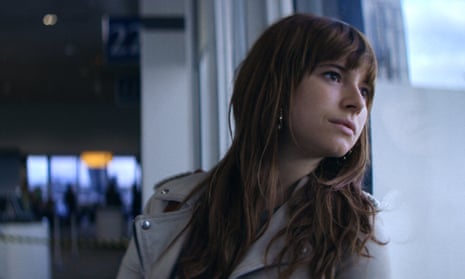The celebrated songwriter Harlan Howard famously defined country music as “three chords and the truth”, a phrase that would subsequently be adopted by the likes of Billy Bragg to define skiffle, punk and all points in between. Screenwriter Nicole Taylor (who wrote the BBC miniseries Three Girls) takes this punchy mantra and tattoos it on the arm of her heroine, an ex-con single mum, living in Glasgow but dreaming of Nashville. “I should have been born in America,” insists the indomitable Rose-Lynn, as she cuts an unruly swath through pubs, clubs and prison bars, reminding us that “Johnny Cash was a convicted criminal”. But beyond such bravado, it’s the power of music to pierce the heart that is the focus of this uplifting, bittersweet film, painting a picture of hardscrabble lives lent lyrical voice by the magic of country.
Jessie Buckley, who proved so electrifying in Michael Pearce’s psychological thriller Beast, lights up the screen as Rose-Lynn Harlan; a 23-year-old firebrand, fresh out of jail, wearing an electronic tag beneath white cowgirl boots. Her redoubtable mum, Marion (Julie Walters), wants Rose-Lynn to settle down and take care of the kids she’s been minding while her daughter was in prison. But Rose-Lynn has a wanderlust that not even a strictly enforced curfew can quell.
Enter Sophie Okonedo’s well-heeled Susannah, whose dissatisfaction with her own privileged life is assuaged when she spies raw talent in her new “daily” woman. Wowed by her anarchic cleaner’s voice, Susannah vows to help Rose-Lynn get her showbiz break. But Rose-Lynn hasn’t t old her wide-eyed employer that she’s not quite the free spirit she seems – that she has family responsibilities tying her to Glasgow, rather than to London or Nashville.
Affectingly directed by Tom Harper, with whom Buckley previously worked on TV’s War and Peace, Wild Rose combines the infectious, musically driven Brit-pic energy of Billy Elliot with the Americana grit of Crazy Heart or even Coal Miner’s Daughter. Despite the apparent disjunction between the rowdy stages of Rose-Lynn’s Glaswegian life and the hallowed halls of Nashville’s Ryman Auditorium (home of the Grand Ole Opry), Taylor finds transatlantic common ground between the grass-roots struggles that lie deep in the heart of this music, wherever it is played. “There’s a reason country is really popular in Scotland,” Taylor told me when I interviewed her at the BFI Southbank recently. “It’s like a suppository for the emotionally constipated!”
That sense of music giving voice to conflicts that might otherwise simply scream in silence is at the heart of Taylor’s script. It’s an idea that is embodied by Buckley, whose performance reaches out from the screen and grabs the audience by the throat. Brilliantly, she manages simultaneously to convey both boisterous confidence and searing self-doubt, rooting her character’s chin-forward recklessness in an underlying sense of confusion about her purpose and destiny.
Beneath her proud protestations of natural-born talent and razor-cut smile, it’s clear that Rose-Lynn is racked with vulnerability. And while the multitalented Buckley – who first made her name as a competitor on the BBC’s 2008 musical contest I’d Do Anything – is evidently at home fronting a powerhouse country band (featuring musical talents such as Neill MacColl, Aly Bain and Phil Cunningham), it’s a moment of a cappella intimacy that strikes the deepest chord, enabling this wild rose to take root in our hearts.
Plaudits, too, to the supporting players, who create a convincing network of warring allegiances among which Buckley pinballs with aplomb. As Marion, Julie Walters is at once scolding and protective, determined to get her daughter back on track with her family, yet fiercely aware of the dreams that remain uncrushed. It’s a lovely performance by Walters, made all the more powerful by its understatement. Sophie Okonedo has a tougher task, ensuring that Rose-Lynn’s new mentor doesn’t become simply a middle-class do-gooder cliche. It’s a challenge to which Okonedo rises nimbly, framing Susannah’s sometimes clumsy interventions within the context of her own tangible frustrations.
Production designer Lucy Spink and director of photography George Steel maintain a fine balance between the down-to-earth reality and head-in-the-clouds aspirations of Rose-Lynn’s world, while composer/supervisor Jack Arnold ensures that the music rings true throughout. No wonder broadcasting giant Bob Harris agreed to an affectionate cameo, the cherry on the cake of a rousing, crowd-pleasing movie that promises to set hearts and heels pounding.

Comments (…)
Sign in or create your Guardian account to join the discussion